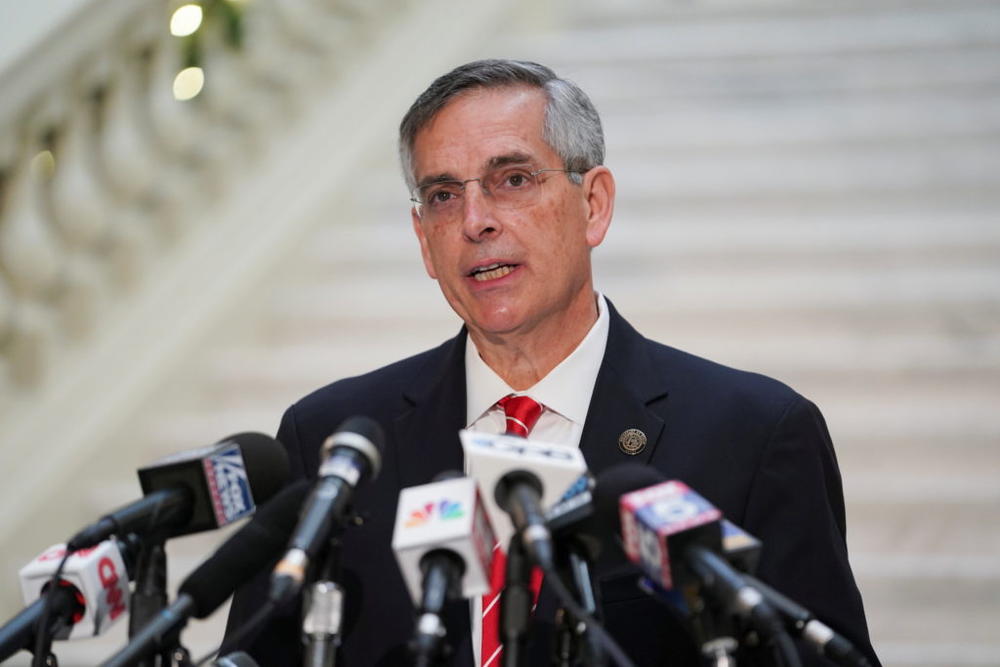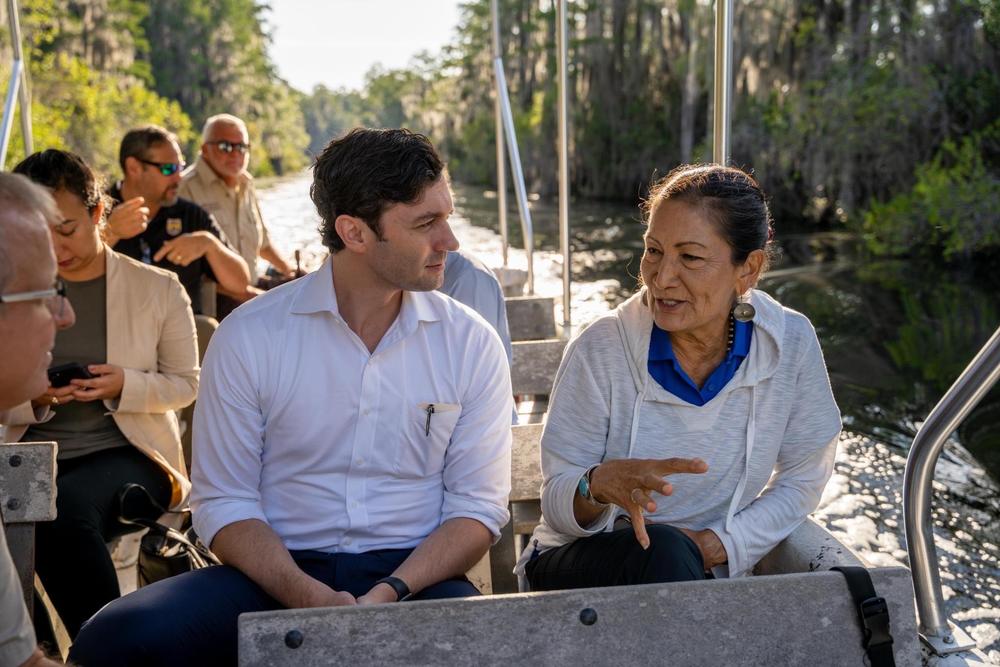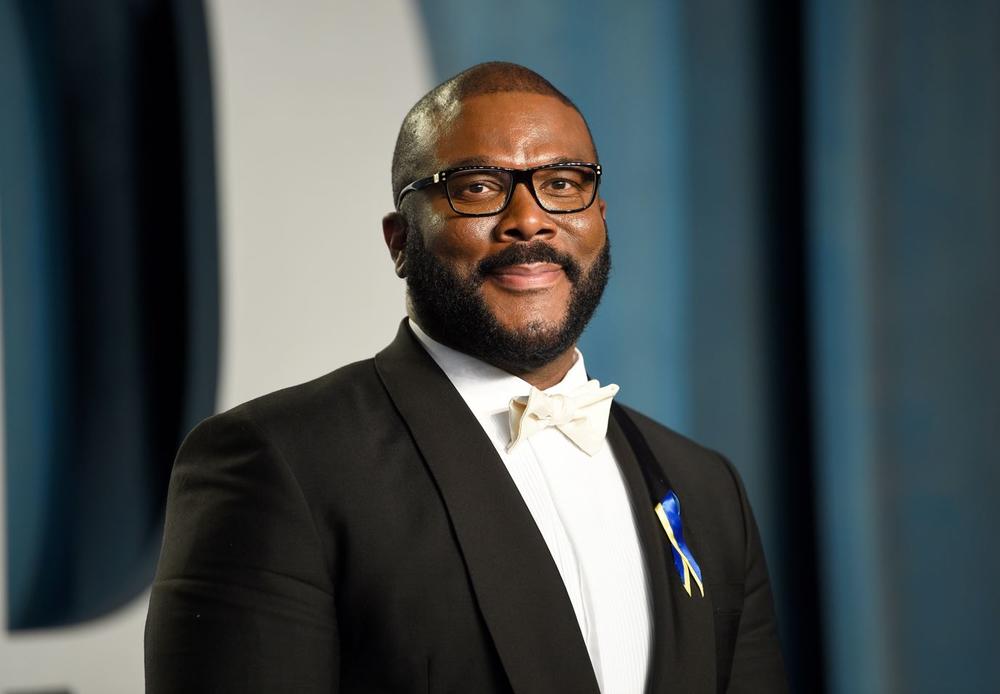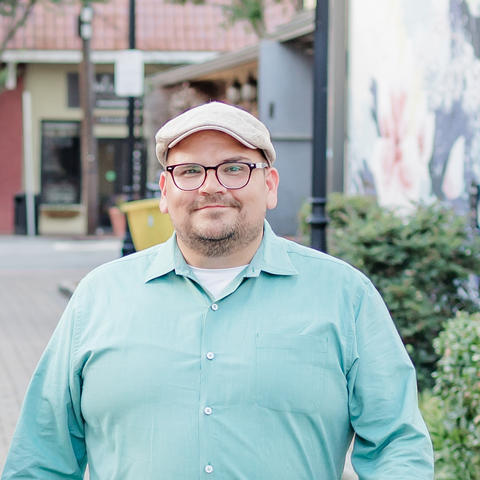
Section Branding
Header Content
Georgia Today: Election probe released, bill to end spam calls, Tyler Perry helping Atlanta seniors
Primary Content
LISTEN: On the Thursday Feb. 16 edition of Georgia Today: Parts of a report into efforts to overturn Georgia’s 2020 election have been released, a new bill may end spam calls, and Tyler Perry is helping low-income seniors in Atlanta.

Peter Biello: Welcome to the Georgia Today podcast from GPB News. Today is Thursday, Feb. 16. I'm Peter Biello. On today's episode, parts of a report into efforts to overturn Georgia's 2020 election have been released. A new bill may put an end to those pesky spam calls you've been getting. And Tyler Perry is helping low income seniors stay in their homes. These stories and more are coming up on this edition of Georgia Today.

Story 1
Peter Biello: Part of a report from the Fulton County special grand jury investigating efforts by former President Donald Trump and his Republican allies to overturn Georgia's 2020 election was released today. GPB's Stephen Fowler has more.
Stephen Fowler: Only three brief snippets of the brief final report have been made public for now, and two important pieces stand out. One: The special purpose Grand jury believes at least one witness lied to them under oath and recommends the DA's office pursue indictments where necessary. Two: After hearing from local elections officials, experts and other witnesses, they found no evidence of widespread fraud that could have altered Georgia's presidential election. But other potential crimes and people that committed them are still kept hidden and, ultimately, Fulton DA Fani Willis will be the one to decide who gets charged and when. For GPB News, I'm Stephen Fowler in Atlanta.

Story 2
Peter Biello: Authorities say their hands are tied when it comes to prosecuting the people who distributed hundreds of antisemitic fliers this month in Dunwoody and Sandy Springs. At this week's Dunwoody City Council meeting, police chief Billy Grogan said the distribution of the fliers is protected free speech. Grogan says the police know who spread those fliers, but other legal considerations, like littering or invading someone's personal property wouldn't warrant an arrest. A bill introduced in the Georgia House of Representatives last month could provide some assistance to police. The bill would define antisemitism in a way that would enable prosecution under the Hate Crimes Act. The definition of antisemitism would require state agencies and departments to, quote, "consider such definition when determining whether an alleged act was motivated by discriminatory, antisemitism intent."
Story 3
Peter Biello: The threat of a "tripledemic" seems to be coming to an end. The flu season started early and peaked in October, both nationally and in Georgia. But hospitalizations are down. GPB's Devon Zwald has more.
Devon Zwald: State public health officials say the simultaneous outbreaks of flu, COVID and RSV — known as the tripledemic — is on the decline in Georgia. State epidemiologist Cherie Drenzek told the Georgia Board of Public Health Wednesday that hospitalizations are down by about 60% since last week in metro Atlanta, where DPH tracks data. For GPB News, I'm Devon Zwald.
Story 4
Peter Biello: An Atlanta-based nonprofit will use a $4 million grant from the federal government to expand treatment for behavioral health. GPB's Ellen Eldridge reports.
Ellen Eldridge: The funding will help CHRIS 180 develop a certified Community Behavioral Health Center to connect people to 24-hour crisis care, including veterans. Anne Cornell is with CHRIS 180. She says the key to preventing emergencies is identifying those with behavioral health concerns early.
Anne Cornell: So the hope is in being able to provide a comprehensive service and have a service array that you can really meet people's and — and manage their needs, give them a support services, skill building, whatever the issue is, before it becomes a major crisis.
Ellen Eldridge: Cornell says CHRIS 180 will continue its work with 80 local schools to connect students to mental health providers. For GPB News, I'm Ellen Eldridge.
Story 5
Peter Biello: If you are tired of getting telemarketing calls, here's something that might give you some relief. The state Senate unanimously passed a bill yesterday that would expand Georgia's law on such calls. SB 73 would hold companies liable for telemarketing calls made by third-party contractors. It also would allow class action lawsuits against telemarketers.

Story 6
Peter Biello: Georgia U.S. Sen. Jon Ossoff is urging state regulators to deny a permit for a proposed mine near the Okefenokee swamp in Southeast Georgia. GPB's Benjamin Payne reports.
Benjamin Payne: In a letter sent Wednesday to the Georgia Environmental Protection Division, Ossoff raised concerns about what he said would amount to irreparable damage to the federally protected wetland. Speaking to reporters, Ossoff called on the agency to scrap its proposed plan for a titanium dioxide mine near Okefenokee, operated by Alabama-based Twin Pines Minerals.
Jon Ossoff: All wetlands are precious. But this is not just any wetland. This is the only blackwater wetland ecosystem of its kind on the entire continent. The wildlife and vegetation native to the swamp are extraordinary in their biodiversity and this is a fragile ecosystem.
Benjamin Payne: The Democrat called on all Georgians to submit public comment to the Georgia EPD by March 20. Next week, the EPD will also hold two virtual public hearings on the mine. But registration is required. For GPB News. I'm Benjamin Payne.
Story 7
Peter Biello: This year, Georgia will extend Medicaid to thousands of uninsured adults. But unlike a full Medicaid expansion, Georgia's program will have its own set of rules limiting who qualifies. GPB's Sofi Gratas reports.
Sofi Gratas: On a Monday afternoon at the Macon Volunteer clinic. Doctors, nurses and administrators in the back assist patients.
Macon Volunteer Clinic: Macon Volunteer Clinic, how may I help you?
Sofi Gratas: The clinic, relies on volunteers to provide free medical services to working low-income patients who don't qualify for health insurance.
Macon Volunteer Clinic: Okay, so you have an appointment at 5.
Sofi Gratas: Dr. Patrick Roche has been volunteering at the clinic since it opened 20 years ago.
Dr. Patrick Roche: Most of the people that we see come from local restaurants, dry cleaners, gas stations, small businesses that don't have to insure them.
Sofi Gratas: Essential workers. Roche says some even work for doctors. In addition to not having access to benefits, they often make too much to qualify for Medicaid, but too little to afford average premiums for marketplace insurance. That puts them in a coverage gap.
Nancy White: So they fall through the cracks.
Sofi Gratas: Nancy White is the executive director at the Macon Volunteer Clinic. She says clinic patients can make no more than $29,000 a year or 200% of the federal poverty level.
Nancy White: So they are very challenged, but they're working.
Sofi Gratas: And working matters for Georgia's planned Medicaid expansion. After years of litigation. Georgia was left with a choice: full expansion the federal way or an alternative plan from the state. George's own Medicaid plan, Pathways to Coverage, will go live in July. That's when some of Georgia's 1.2 million uninsured adults will be eligible for Medicaid, but only if, like the patients at the volunteer clinic, they work. People between 19 and 64 years old will qualify for the plan only if they complete 80 hours a month of certain activities, like work, but also community service or higher education. The state's idea, as described in language of the program itself, is to create, quote, "incentive for participation in work and other employment related activities for those not currently engaged." Laura Colbert is executive director of Georgians for a Healthy Future. She has doubts.
Laura Colbert: The evidence is nonexistent that the work requirement would motivate somebody to kind of go out and get a job when they wouldn't otherwise.
Sofi Gratas: Why, she asks, would health insurance be a stronger incentive to work than basics like food and shelter?
Laura Colbert: Medicaid will not pay your rent, your utility bill or put gas in your car. And you know, it's not like people get a check for Medicaid. All they get is health care.
Sofi Gratas: But more importantly, Colbert says that while Pathways will expand coverage, it doesn't include everyone that needs it. That's because lots of people simply can't work.
Laura Colbert: Not only are people with serious mental illness and full-time caregivers going to be left out, but there will also be some groups that are disproportionately left behind.
Sofi Gratas: Like those in rural areas where there aren't good-paying jobs or some minorities living in historically disinvested communities. Or even some patients at the Macon Volunteer Clinic.
Macon Volunteer Clinic: Okay. So you would have to be actively employed.
Sofi Gratas: To qualify for Pathways, people can only make up to $15,000 a year. But remember, at the volunteer clinic, the cutoff for a patient is $29,000. So many seen at the free clinic will stay uninsured. Plus, Dr. Patrick Roche says the care he can provide them has limits.
Dr. Patrick Roche: Perhaps someone has gallbladder disease and they need to have a gallbladder surgery. But until their gallbladder gets infected and they become septic and have to go to the emergency room, they can't afford that procedure.
Sofi Gratas: In communities without free or low-cost clinics, emergency rooms will likely remain the place for primary care. Georgia's Department of Community Health estimates more than a quarter million people will be eligible for Pathways to Coverage this summer. Meanwhile, nearly 900,000 will remain uninsured. For GPB News, I'm Sofi Gratas in Macon.

Story 8
Peter Biello: Actor and filmmaker Tyler Perry is donating $2.75 million to older homeowners in Atlanta to help keep them in their homes. The Atlanta Journal-Constitution reports that Perry reached out to the city a few weeks ago about providing assistance for residents on fixed incomes who could lose their homes as a result of rising real estate taxes. Perry is going to pay the back property taxes for 300 low-income seniors in Atlanta. The assistance will cover city, county and school taxes. Perry also will cover any increase in taxes over the next 20 years for 100 low-income older residents.
And that is it for this edition of Georgia Today. Thanks very much for tuning in. If this is not your first time with us, welcome back. And if it is your first time with us, welcome. We hope you'll join us tomorrow as well. The best way to remember to do that, of course, is to subscribe to this podcast. So make sure you do that. That way you open up your podcast app tomorrow, we'll be right there waiting for you. And if you've got thoughts on what you've been hearing or if you'd like to hear something in particular, there's a story we haven't yet tuned into, please let us know. The best way to contact us is by email. You can send it to GeorgiaToday@GPB.org.
And oh yeah, one final thing. Leave a review if you like this podcast; that helps other listeners find us. I'm Peter Biello. Thanks again for listening to Georgia Today. We'll see you tomorrow.
——
GPB's Georgia Today newsletter hits your inbox on Tuesdays, Wednesdays and Thursdays with top stories from around the state featuring news, politics and more. Subscribe here.



